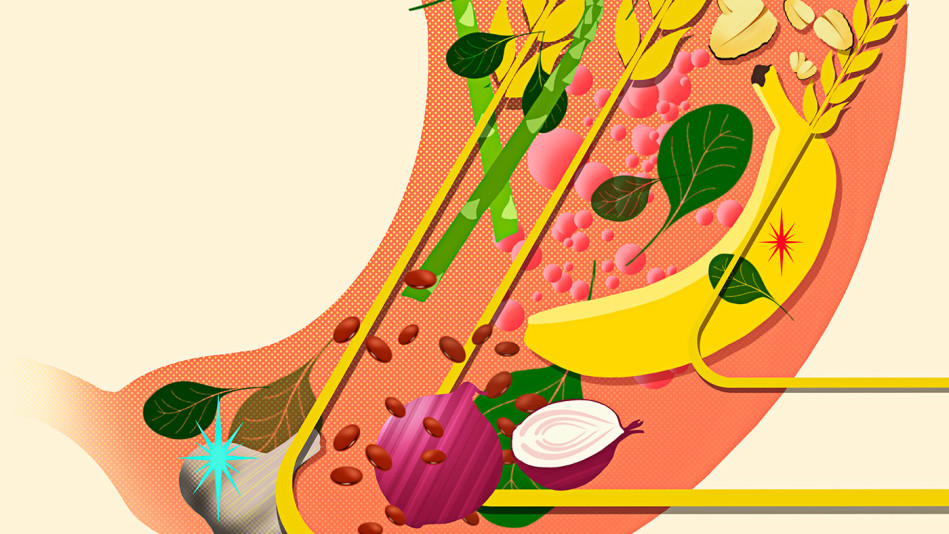3 Gut Health Habits That Can Help You Control Your Weight
How cultivating the right bacteria may help keep your weight in check.

Illustration: Mark Allen Miller
You exercise, you control your portions, you limit sweets—but what have you done for your gut bacteria lately? If you think that sounds odd, think again. "We're finding that the composition of your gut microbiome is a crucial factor in gaining and losing weight," says Gerard E. Mullin, MD, an associate professor of medicine at the Johns Hopkins Hospital in Baltimore and author of The Gut Balance Revolution.
Most of your gut microbiome, or your intestinal flora, is dominated by two classes of bacteria—firmicutes and bacteroidetes—and research has shown that obese people typically have a significantly higher ratio of the former to the latter. This makes sense, considering how the two types of bacteria function: Firmicutes are excellent at converting food to energy and promoting the storage of fat in the body, says William DePaolo, PhD, an associate professor of medicine and director of the Center for Microbiome Sciences & Therapeutics at the University of Washington Medical Center in Seattle. What's more, he adds, firmicutes also help produce serotonin, the feel-good hormone. It's thought, then, that the more you eat, the more your fat-storage-promoting firmicutes flourish, which may then rev up your serotonin production, which boosts your mood—and, in a vicious cycle, strengthens your craving to eat even more.
Bacteroidetes, meanwhile, have a totally different effect: They specialize in breaking down bulky plant starches and fibers into energy that the body can immediately use, so that it's not stored as fat, DePaolo says. But you—and your microbiome—are what you eat. "When you change your diet over the long term, you can change your gut bacteria," he says. Here's how to help your gut help you achieve, or maintain, a healthy weight.
Become a hard-core herbivore.
Bacteroidetes feed on fiber and resistant starches—a.k.a. vegetables. Studies have found that eating a vegetarian or plant-rich Mediterranean diet increases bacteroidetes and reduces firmicutes, while a typical meat-heavy Western diet does the opposite. So sample widely from the salad bar: One review of more than 50 studies found that eating an additional 14 grams of fiber per day was associated with a loss of about four pounds in just under four months.
Check out probiotics.
They're not magic pills that will make you shed pounds overnight, but Mullin says that some types of probiotics, including Lactobacillus gasseri, L. plantarum and L. paracasei, may indirectly encourage weight loss by helping block fat absorption. These supplements, which you can find in capsule form, are considered safe for healthy people (any side effects, such as gas or bloating, are usually mild).
Avoid unnecessary antibiotics.
These bug killers wipe out all your bacteria, not just the ones making you sick. And prescription drugs aren't all you need to watch out for; it's also a good idea to scrub your diet of stealth meds by eating organic, antibiotic-free meat, poultry, fish, eggs and dairy. If your doctor does prescribe antibiotics to treat a urinary tract infection or strep throat, Mullin recommends eating kefir or fermented foods, like tempeh, sauerkraut and kimchi, which will help repopulate your gut. Welcome back, beneficial bugs!
Most of your gut microbiome, or your intestinal flora, is dominated by two classes of bacteria—firmicutes and bacteroidetes—and research has shown that obese people typically have a significantly higher ratio of the former to the latter. This makes sense, considering how the two types of bacteria function: Firmicutes are excellent at converting food to energy and promoting the storage of fat in the body, says William DePaolo, PhD, an associate professor of medicine and director of the Center for Microbiome Sciences & Therapeutics at the University of Washington Medical Center in Seattle. What's more, he adds, firmicutes also help produce serotonin, the feel-good hormone. It's thought, then, that the more you eat, the more your fat-storage-promoting firmicutes flourish, which may then rev up your serotonin production, which boosts your mood—and, in a vicious cycle, strengthens your craving to eat even more.
Bacteroidetes, meanwhile, have a totally different effect: They specialize in breaking down bulky plant starches and fibers into energy that the body can immediately use, so that it's not stored as fat, DePaolo says. But you—and your microbiome—are what you eat. "When you change your diet over the long term, you can change your gut bacteria," he says. Here's how to help your gut help you achieve, or maintain, a healthy weight.
Become a hard-core herbivore.
Bacteroidetes feed on fiber and resistant starches—a.k.a. vegetables. Studies have found that eating a vegetarian or plant-rich Mediterranean diet increases bacteroidetes and reduces firmicutes, while a typical meat-heavy Western diet does the opposite. So sample widely from the salad bar: One review of more than 50 studies found that eating an additional 14 grams of fiber per day was associated with a loss of about four pounds in just under four months.
Check out probiotics.
They're not magic pills that will make you shed pounds overnight, but Mullin says that some types of probiotics, including Lactobacillus gasseri, L. plantarum and L. paracasei, may indirectly encourage weight loss by helping block fat absorption. These supplements, which you can find in capsule form, are considered safe for healthy people (any side effects, such as gas or bloating, are usually mild).
Avoid unnecessary antibiotics.
These bug killers wipe out all your bacteria, not just the ones making you sick. And prescription drugs aren't all you need to watch out for; it's also a good idea to scrub your diet of stealth meds by eating organic, antibiotic-free meat, poultry, fish, eggs and dairy. If your doctor does prescribe antibiotics to treat a urinary tract infection or strep throat, Mullin recommends eating kefir or fermented foods, like tempeh, sauerkraut and kimchi, which will help repopulate your gut. Welcome back, beneficial bugs!



